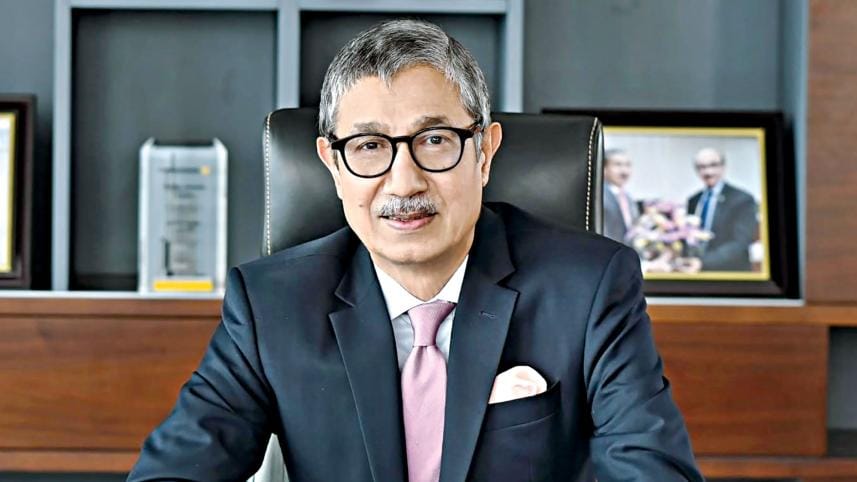“Dhaka Bank recognizes the importance of continuous skill development”

TDS: What is the current status of digitalization within your organization?
Emranul Huq (EH): Dhaka Bank's Digital Banking services and solutions offer a comprehensive suite of options to meet the banking and transaction needs of individuals and businesses.
Dhaka Bank Go: App-based banking solution for individual and SME proprietorship customers that simplifies financial transactions and banking services at any time and from anywhere.
Dhaka Bank Direct Banking: Flexibility to access accounts for individual, SME and corporate customers from anywhere.
EzyBank: Mobile app-based solution enables quick instant Account opening from home.
Self-Banking Portal: Online DPS & FDR Account Opening and submission of Tax Return slip/Debit Cards request from Home.
DBL nano savings scheme: Digital deposit product in collaboration with Bkash.
E-Rin: Digital product solution for Individuals which provides loan from Tk. 1,000 to Tk. 50,000 within hours.
SME DigiLoan (Digital Loan processing system for SME): A robust, integrated technology-based platform for banks to onboard SME borrowers and assess credit risk.
DBL-PRAN B2C Portal: It is an end-to-end solution where the buyer, seller, and bank can digitally send loan requests, approvals, and disbursements.
Dhaka Bank C Solution: An online cash management solution for corporate clients that simplifies the management of bulk payments and collections.
Robotic Process Automation (RPA): RPA is a technology that mimics human actions on computers, such as typing, copying, and pasting, etc. The bank is gradually automating banking processes using RPA and has already automated more than 20 processes.
TDS: What challenges do you see in implementing digital transformation within the financial sector?
EH: Introducing digital transformation poses challenges such as:
• Lack of digital literacy
• Security concerns by customers
• Unbanked population
• Inadequate digital infrastructure and unavailability of internet connectivity
Implementing the following measures will empower the bank to confront the impending obstacles:
• Invest in advanced technologies and artificial intelligence.
• Educate customers.
• Collaborate with fintech companies.
• Strengthen cybersecurity measures.
• Tailor incentives to encourage customers to transition to digital banking.
TDS: How does your organization guarantee security, encompassing cybersecurity, prevention of forgery, and the safety of data?
EH: We prioritize security, diligently implementing strong measures to safeguard cyber and data integrity. Our dedicated teams maintain a vigilant watch over our security protocols, ensure they are continuously updated, and consistently revise security standards to remain aligned with the ever-evolving industry best practices. The bank has obtained three industry-level certifications to protect data and ensure secure payment transactions:
PCI-DSS (Payment Card Industry Data Security Standard)
ISO-27001 (Information Security Management Systems-ISMS)
TIA-942-B-2017 (Telecommunications Infrastructure Standard for Data Centers).
TDS: How does digitalization contribute to addressing sustainability and the inclusion of unbanked individuals in the banking sector?
EH: Digitization in Bangladesh is revolutionizing banking, simultaneously addressing sustainability, expanding loan accessibility, and promoting financial inclusion. Through digital platforms like mobile and agent banking, unbanked individuals are being economically empowered. This transformation allows for tailored financial solutions, removing geographical barriers and simplifying processes. The shift towards digitization is also driving sustainability by reducing paper usage and energy consumption, introducing eco-friendly financial products like digital loans, and streamlining loan processing for quicker and more accessible procedures.
TDS: What future plans does your organization have to enhance digitalization?
EH: Our bank recognizes the importance of continuous skill development and education to meet the evolving demands of the digital banking landscape. We remain committed to supporting initiatives such as training programs, skill development projects, and collaborations with institutions to bridge the skills gap. Our future plans include expanding educational efforts, investing in cutting-edge technology, integrating with Fintech, PSOs, and innovating digital banking services to ensure a seamless transition towards a more digitized Bangladesh.



 For all latest news, follow The Daily Star's Google News channel.
For all latest news, follow The Daily Star's Google News channel.
Comments